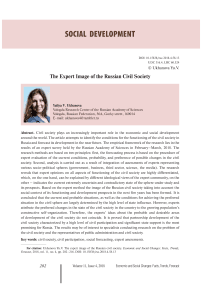The expert image of the Russian civil society
Автор: Ukhanova Yuliya V.
Журнал: Economic and Social Changes: Facts, Trends, Forecast @volnc-esc-en
Рубрика: Social development
Статья в выпуске: 4 (58) т.11, 2018 года.
Бесплатный доступ
Civil society plays an increasingly important role in the economic and social development around the world. The article attempts to identify the conditions for the functioning of the civil society in Russia and forecast its development in the near future. The empirical framework of the research lies in the results of an expert survey held by the Russian Academy of Sciences in February-March, 2018. The research methods are based on two principles: first, the forecasting process is based on the procedure of expert evaluation of the current conditions, probability, and preference of possible changes in the civil society. Second, analysis is carried out as a result of integration of assessments of experts representing various socio-political spheres (government, business, third sector, science, the media). The research reveals that expert opinions on all aspects of functioning of the civil society are highly differentiated, which, on the one hand, can be explained by different ideological views of the expert community, on the other - indicates the current extremely uncertain and contradictory state of the sphere under study and its prospects...
Civil society, civil participation, social forecasting, expert assessments
Короткий адрес: https://sciup.org/147224074
IDR: 147224074 | УДК: 316.4 | DOI: 10.15838/esc.2018.4.58.13
Текст научной статьи The expert image of the Russian civil society
In today’s world community, all spheres of its public life (political, economic, and social) are undergoing democratization. Development of civil society institutions, involvement of citizens in addressing issues at the local, regional, and federal levels become important forms of administration [1, p. 7]. In recent years, in the Russian public and scientific discourse, more and more attention is paid to the increasing importance of civil society in the country. Meanwhile, in order to make it a major development factor, we need a clear understanding of its goals and prospects.
In Russia, forecasting development prospects, including those for civil society, is coming to the fore in connection with the presidential election and, accordingly, with a new political season, which may launch fundamental changes affecting most spheres of society. The new cycle always means uncertainty, which no doubt increases interest in forecasting. According to the definition given by E. Jantsch, a forecast is a probabilistic statement about the future with a relatively high degree of reliability [2, p. 19]. Interest in social forecasting is manifested not only in the curiosity about the future, but also in the desire to influence it in the convenient direction [3]. Consequently, the importance of assessing the prospects for the development of civil society is not so much in what it allows to foresee, but rather in the fact that the results provide an opportunity to develop targeted, scientifically substantiated actions.
In cases where the object is so complex and unpredictable that it is almost impossible to take into account the influence of many factors analytically, it is reasonable to use a methodology focused on sociological tools such as questionnaire poll (survey, interviewing) of the general public and experts. An especially important role belongs to the method of expert evaluations (population surveys in forecasting practice are rarely used): the resulting individual and collective expert assessments are used as the final forecast or as input data in complex forecasting systems [4, 20].
Evaluation and forecasting of the prospects for development of the public sphere on the basis of the experience and intuition of specialists is in the focus of attention of Western researchers. The method of expert assessments widely known in the mid-1960s was described by O. Helmer and colleagues, who attempted to avoid the intervention of psychological factors through anonymity and, at the same time, the group nature of the answer during the expert survey [5; 6]. The contribution of foreign scientists to the study of the subjectivity of expert assessments and the subjective probability of forecasts is also significant [7; 8; 9]. Sociological research, based on the method of expert assessments, is being developed in the modern period, as well. In particular, in 2017, F. Li and S. Pye carried out a project to identify socio-political and technological prospects for the UK to achieve its targets in 2050 on the basis of semi-structured interviews with experts from the government, industry, academia and civil society [10].
In Russia, a great contribution to the study of the problem of social forecasting on the basis of expert assessments was made by the staff of the Institute of Sociology (Social Forecasting Sector) and ZIRCON Research Group, which in 1991–1995 implemented a major scientific project “Russia: prospects for the transformation process” [11]. As a result, the prospects of the method under consideration were confirmed – in early 1993, the experts named the most likely events: the change of government, the off-year election and the adoption of a new Constitution.
In the future, this method was used in the framework of an expert scenario-forecasting monitoring “Russia 2020. A strategy for transition” carried out under the supervision of M.K. Gorshkov. As a result of the study, the scientists came to the conclusion about the effectiveness of this technique used for determining the typical ideas of the intellectual community about the future of the country. On the whole, the authors note that “the probable future of the Russian society is vague” [12, p. 345-346].
The problem of expert forecasting of the space of civil society has also attracted the attention of Russian scientists. In 2009, ZIRCON Research Group implemented an expert-analytical project “Short-term scenario forecasting of civil society development in Russia”. The study produced the following major results: it identified the leading trends in the public sphere such as the weakening of the financing of civil society organizations by the state and business, strengthening of state control over civil organizations, and growth of informal social activity of citizens, which is largely observed in recent years [13].
The researchers conclude there are several methodological difficulties that complicate the forecasting of the development of civil society. First, it is important to bear in mind that the work of the civil sector depends largely on the ongoing macro-processes. In particular, international sociological studies show that civic activity depends on governmental policy, the level of democratic and economic development, the effectiveness of government structures, the level of corruption, the amount of spending on social services, value orientations in society, etc. [14]. At the same time, we think that at present there are very few reasonable hypotheses about the nature of the impact of these conditions on the development of civil society.
Second, problems in forecasting are created by differences in the understanding of the very essence of civil society [13, p. 145]. In connection with the above, we believe that it is appropriate to use a technique focused on the use of expert knowledge to carry out scientific analysis of the prospects of development of civil society.
The subject of our research is the state and prospects of development of civil society in expert assessments. We adhere to a definition proposed by the World Alliance within the framework of a research project on integrated assessment of the state of civil society “CIVICUS Civil Society Index (CSI)”, according to which “civil society” is understood as an arena outside the family, the state and the market, created by individual and collective actions, as well as by organizations and institutions for the purpose of promoting common interests [15, p.7].
The aim of our work is to create an expert image of civil society, taking into account current conditions, and probable and preferred changes in the medium term (five years).
Achieving the goal involves addressing a number of tasks:
-
1. To consider the social context of the functioning of civil society in the country, including the challenges in the development of this sphere; to identify significant active actors of civil society.
-
2. To identify the likely situation of civil society development and the most likely actions of key actors.
-
3. To determine the preferred situation of civil society development and the necessary conditions for its achievement.
Research methodology and technique
In the present paper we use the tools of the expert scenario-forecasting monitoring “Russia 2020. A strategy for transition”, carried out by
RAS Institute of Sociology in collaboration with ZIRCON Research Group in July – October 2015. We proceed from a set of opinions developed within the framework of this project and related to the current state of various parties of the Russian society, as well as its probable and desirable development (120 statements), which were transformed into survey questions. For the purpose of analysing civil society, 57 judgments affecting the public sphere were selected.
Thus, the work is based on two key methodological principles. First, the forecasting process is based on the procedure of expert assessment of current conditions, probability and preference of possible changes in the state of civil society. Second, the analysis is carried out by integrating the assessments of experts from different fields.
In the Vologda Oblast, the expert survey involved 30 people from five selected areas (5–7 experts each): 1) authorities: state and municipal employees; 2) business: representatives of business structures; 3) “third sector”: representatives of public associations and NPOs; 4) media: heads of TV and radio broadcasting companies, chief editors of print media, journalists; 5) academia: scientists. It can be argued that the study involved experts from different segments of Russian society, which allows us to characterize the results as representative.
It was mandatory that the experts who participated in the survey had a high social status in the region, because in many ways this factor increases the level of public trust in the results of expert forecasting. As a result, experts holding senior positions in organizations were involved in the survey. The opportunity to participate in the survey and the deadline for filling-in the questionnaires were previously agreed with the experts. The questionnaires were collected in February – March 2018. Communication with the experts was carried out mostly by e-mail; the experts received the questionnaires via e-mail, filled them in and sent them back to us the same way. Five experts filled in the questionnaires in hard copy.
The results for each question are presented by expert assessments, distributed on a scale from one to ten points, the average score is calculated on their basis. The study uses a conventional scale, according to which the average score from 0 to 3 is considered as low, 4–6 – medium, 7–10 – high. In order to build a model of expert image of civil society, we selected judgments for each block with an average value from 6.5 to 10 points (high level).
Kendall’s coefficient of concordance (multiple rank correlation coefficient) was calculated in order to identify the consistency of experts’ opinions on the grouped blocks of questions. The coefficient of concordance can take values from 0 to 1, with 0 meaning complete inconsistency of opinions, and 1 – their complete consistency.
Research results
Conditions of functioning of civil society: social context, internal challenges, actors
In the study of civil society, priority is attached to the question of the conditions in which it operates. According to expert estimates, the social context of civil society development is characterized by a high level of patriotism and readiness to protect the homeland and its interests (average score – 6.6; Fig. 1 ). Patriotism in this case is considered as a form of social consciousness and political behavior [16, p. 598]. We emphasize that expert assessments are consistent with the data of sociological surveys of the population. In particular, according to the results of the research conducted by the Public Opinion Foundation, in Russia there is an increase
-
Figure 1. Social context in which civil society is functioning*
Level of patriotism, readiness to defend the homeland and its interests
Level of interpersonal trust, tendency toward solidarity, cohesion (social capital)
Level of tolerance, prevalence and acceptance of alternative points of view and types of social behavior,...
Level of trust in the authorities (government, state institutions, courts, and law enforcement agencies)
Level of social activity of citizens, the desire to influence the government, to change the surrounding reality
Level of inter-ethnic tension
Level of real religiosity, proportion of churchgoing and observant citizens nationwide
Level of trust in democratic values and institutions (elections, parties, the media…)
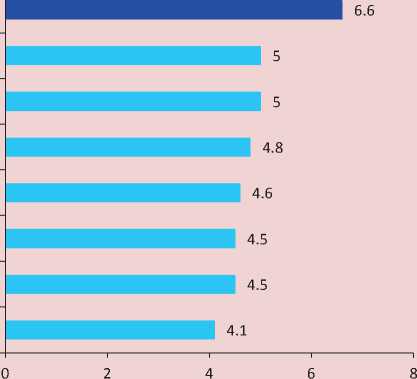
In this and other figures, the colors denote the following:

High level (6.5–10 points)
Average level (4–6 points) Low level (0–3 points)
* The level of each indicator is assessed on a 10-point scale, where “1” is an extremely low level, “10” is an extremely high level. Ranked in the descending order of the average score.
in patriotic sentiments: the proportion of respondents who consider themselves patriots increased by 21 percentage points (from 57 to 78%) in the course of 11 years (from 2006 to 2017) 1 .
Other judgments such as the level of interpersonal and institutional trust, the level of tolerance, social activity of citizens, religiosity and ethnic tension (the average score is from 4 to 5 points) received average scores; while the level of trust in democratic values and institutions was assessed as being the lowest (4.1 points). Thus, the data obtained allow us to conclude that experts more critically assess the effectiveness of the model of Russian democracy and democratic institutions, which are designed to promote the development of civil society. All-Russian and regional sociological studies also reveal a contradictory trend – those institutions the purpose of which is to represent the interests of people (political parties, the judiciary system, the media, nongovernmental organizations, etc.) enjoy less support than the authorities, including law enforcement agencies [12, p. 178; 17].
According to the integrated assessments of experts, the extremely relevant and totally irrelevant internal challenges that pose a potential threat to the development of civil society have not been identified. All judgments received an average score (from 5 to 6 points; Fig. 2 ). At the same time, the identity crisis
-
Figure 2. Internal challenges to the development of civil society*
Lack of national ideology, common images of the past and future of the country
Irremovability of the government, lack of democratic mechanisms of its renewal
Alienation of society from the government, absence of dialogue between the government and society
Behavioral conservatism of the population, unreadiness to social and technological innovations, resistance to them
Identity crisis - loss of grounds for self-determination, for distinguishing between "friend" and "foe" in social and political terms
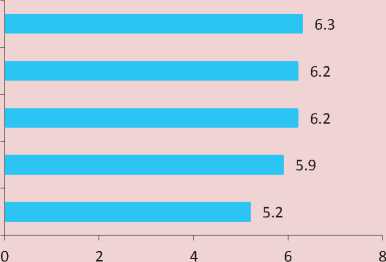
* Assessment of the acuteness of each problem on a 10-point scale, where “1” is completely irrelevant, “10” is extremely relevant, “very hot”. Ranked in the descending order of average score.
(5.2 points) was marked as the least relevant among the statements. This is a positive point, because components of identity (in particular, absorption of values of constructive participation in social interactions) in many ways determine the viability of civil society. At the same time, the alienation of the population from the authorities, the absence of dialogue between them is a serious problem for Russian society. According to the European Sociological Survey (ESS), in 2016, 74% of Russians said they could not participate in the political life of the country (the average value for 16 countries is 64%)2.
According to experts, state-owned media can be considered the most active subjects of the civil sphere, which can have an impact on the future development of Russian society (7.7 points; Fig. 3). Such subjects as opposition parliamentary and non-parliamentary parties, foreign funds and NPOs recognized as foreign agents received low scores. Thus, state-owned media (rather than, for instance, nongovernmental organizations) are identified by experts as the most influential actors in the non-governmental sector; private and nongovernmental media rank second.
According to the final data, the actors of the institutional part of civil society (NPOs and non-governmental associations) received lower estimates than the subjects of informal societies (local communities, initiative groups, etc.; the average score was 4.2 vs. 4.9), which indicates the restructuring of the civil society space and the complexity of the modern landscape of the civic sphere.
These conclusions are consistent with official statistics: in Russia there is a steady trend of reducing the number of non-governmental associations, which along with NPOs represent the main space for institutional civic participation. Thus, at the end of 2016, there were 98,603 registered non-governmental associations in the country as a whole, which amounted to 98% in comparison with the level of 2015 (100,405 units) and 95% in comparison with the level of 2013 (103,325 units) [18].
Recently, in Russian society, along with traditional types of civic engagement (activities of non-governmental organizations), there is a growing number of “short-term projects”
Figure 3. Impact of civil society actors on the development of Russian society in the next five years*
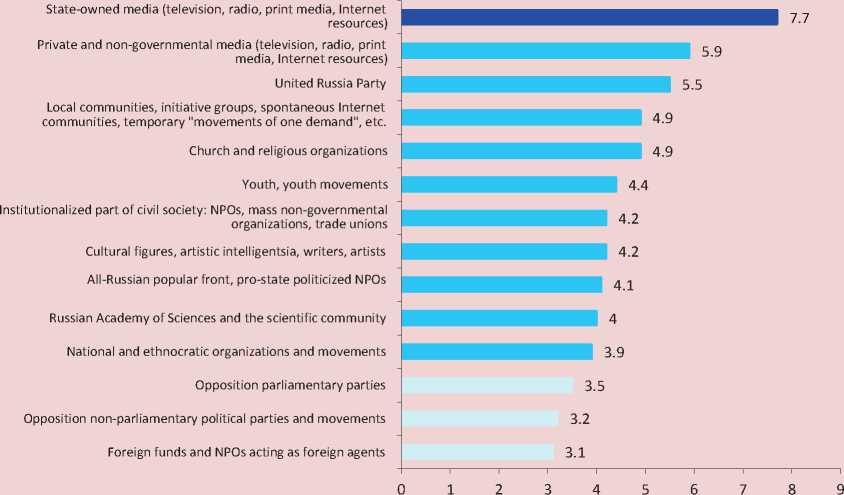
* The degree of impact of each subject (actor) is assessed on a 10-point scale, where “1” means there is no impact, “10” means there is a very strong impact. Ranked in descending order of average score.
– short-term event forms of participation, which provide an opportunity to improve the effectiveness of rapid action and to carry out social mobilization [19]. At the same time, when analyzing the forms of civic engagement, B. Barber concludes that the reduction of the number of associations in favor of informal participation is a sign of the crisis of social relations [20].
Probable situation in the development of the sphere of civil society: actions of the subjects and possible events and processes
According to experts, the most likely actions of the subjects of socio-political processes in the civil sphere in the next five years will include the tightening of state control over the activities of the media and the Internet (6.7 points; Fig. 4). According to experts, it is unlikely that there will be a new wave of democratic reforms related to the protection of citizens’ rights and business (3.8 points); the same relates to the increase in the activity of foreign funds (3.4). Experts consider the development of protest movements to be less likely (2.9). To support such opinions, we note that according to sociological measurements there is a decline in the potential of protest. According to the results of population surveys conducted by VolRC RAS in the Vologda Oblast, 33.4% of respondents were ready to participate in protest actions in 1997, 20.7% – in 2007, and 17.4% – in 2017 [21, p. 170]. It follows from the data obtained that both the experts and the population as a whole do not consider the protest as a promising form of civic participation in the development of Russian society.
Experts have named the change of generations among public leaders and the emergence
Figure 4. Probability of actions of the main subjects of socio-political processes in the next 5 years*
The state tightens control over the activities of the media and the Internet
The state sharply reduces its presence in the social sphere, transferring part of the functions of social services to private businesses and non-profit organizations
The Church (different confessions) strengthens its expansion into social life, actively influences the formation of norms of public behavior
Campaign of self-criticism among the authorities, the All-Russian popular front strengthens the fight against bureaucratic arbitrariness and corruption, begins a campaign of criticism of negligence and incompetence of mangement authorities
The Government begins a new wave of democr,atic reforms concerning the protection of the rights of citizens and business (including amnesty), freedom of speech, elections, assembly, etc.
Foreign funds and NPOs increase their activity and expand their work in Russia
The precariat, the poorest and most disadvantaged population groups initiate mass protests across the country
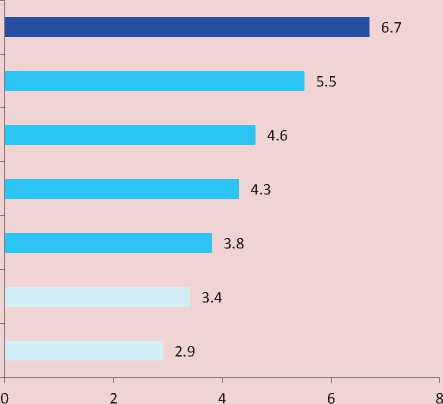
* Ranked in descending order of average probability.
Figure 5. Probability of changes in civil society in the coming years (in five years)*
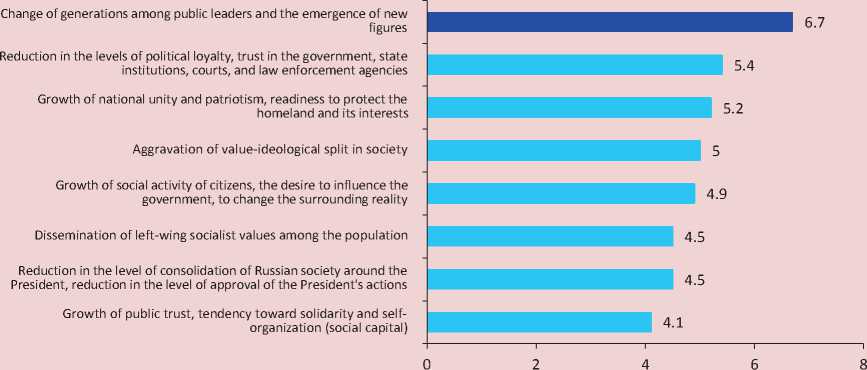
of new figures that enjoy the authority of the public as he most likely events or processes in the sphere of civil society in the next five years, (6.7 points; Fig. 5). The remaining judgments received average scores (from 4 to 5.4 points). The least likely processes, according to the expert community, include the growth of public trust and a tendency toward selforganization, which is the basis of social capital (4.1 points). Meanwhile, social capital serves as an important resource for the activation of modernization processes, including those in the field of civil society [22]. As F. Fukuyama noted, the political activity of the population is largely determined by trust, and trust, in turn, affects the activity in the communities [23].
Preferred development of civil society, the necessary conditions to achieve the desired situation
According to experts, the most preferable processes in the civic sphere are the growth of social and political activity of citizens, development of social entrepreneurship and social innovations, increase of civic engagement through e-democracy, growth of tolerance, and public discussions on the issues of civil identity (average score – from 6.5 to 8; Fig. 6 ). Less desirable social processes, according to experts, are the development of social media in the Internet space, reduction of social activity of young people, the growth of religiosity (average score – from 4 to 5.7). Thus, we can say that experts associate the successful development of society primarily with a constructive civil selforganization, although such trends are assessed by them as unlikely.
Based on the data obtained, we can say that in order to achieve the preferred situation in the field of civil society, the conditions that are associated with the activities of the authorities at different levels are more necessary (average score from 6.6 to 8.7%; Fig. 7 ). Under the circumstances, the Russian Orthodox Church can play the least important role in achieving the preferred situation (4.4 points). According to some researchers, the 21st century will be the “age of religiosity”, and the priority of religious ideas will only increase in the future [24]. According to academician G.V. Osipov, on the contrary, “the coming century, according to the forecasts and conclusions of futurology, should be the century of the triumph of scientific worldview” [25, p. 9]. The expert community also does not predict the growth of religiosity among Russians and therefore does not see the need to strengthen the influence of the Russian Orthodox Church. In general, according to experts, the successful development of
Figure 6. Desirable changes for the successful development of Russian civil society in the next 5 years*
The growth of social and political activity of citizens, their desire to influence the government, to change the surrounding reality
Development of social entrepreneurship and social innovations
Increasing citizen participation through various forms of e-democracy (collective online petitions and appeals, e-voting, "open data" monitoring)
Growth of tolerance, prevalence and acceptance of alternative points of view, types of social behavior, freedom of speech
Public discussions on the topic of Russian civil identity, search and definition of national interests taking into account traditional values and national culture
Growth in the number of active users of "national" and global social media (VKontakte, Odnoklassniki, Facebook, etc.)
Decline in the political activity of young people, their shift to local social activity (do "small deeds")
Growth in the number of churchgoing and observant citizens
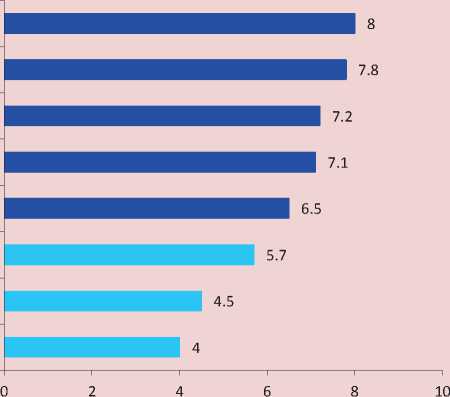
Figure 7. Conditions for achieving the desirable situation in the sphere of Russian civil society*
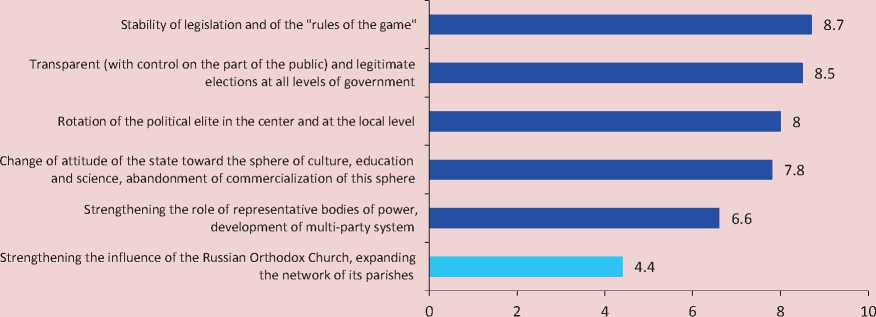
* The need for each factor and condition is assessed on a 10-point scale, where “1” means it is not necessary at all, “10” means it is absolutely necessary. Ranked in descending order of average score.
Russian society is determined primarily by the government.
In assessing the level of consistency of expert assessments, we reveal that the greatest consolidation is observed in the experts’ perception of the role of various subjects of the civil sphere (coefficient of concordance is 0.404), the probability of their actions in the next five years (coefficient of concordance is 0.386), and the conditions for achieving the preferred situation in Russian civil society (coefficient of concordance is 0.387; Tab. 1 ). In other words, despite the significant difference in the socio-political position of the experts participating in the survey, the understanding of these aspects is largely similar. The assessment of desirable changes for the successful development of civil society in Russia in the next five years (0.305) looks somewhat less consistent. The opinions of experts were to a greater extent different in assessing the probable situation and internal challenges to the development of civil society – the consistency of assessments on these judgments is lower than on other issues (0.133 and 0.039).
In general, it should be noted that there is a high degree of differentiation of experts’ opinions on all the aspects of the functioning of civil society the concordance coefficient does not approach unity on any of the issues. On the one hand, this can be explained by the difference in the ideological views of experts. On the other hand, it may indicate an extremely uncertain and contradictory current state of the sphere under consideration and its prospects. It is noteworthy that in 2008, when the scientists of the ZIRCON Research Group were implementing the project on expert forecasting of civil society in Russia, they also pointed out the inconsistency of assessments, which, in their opinion, was due to the uncertainty of the object itself [13].
Combining the judgments that have high scores (average score 6.5–10 points) into three modules: the current, probable and preferred situations in the field of civil society, we have formulated an expert image of civil society (Fig. 8) . The analysis of the results shows that the current and probable situations, as well as the conditions for achieving the preferred
Table 1. Level of consistency of expert assessments (Kendall’s coefficient of concordance)*
|
No. |
Name of the block |
Coefficient |
|
1. |
Characteristics of the social context of civil society development |
0.292 |
|
2. |
Internal challenges for the development of civil society |
0.039 |
|
3. |
Influence of civil society actors on the development of Russian society in the next five years |
0.404 |
|
4. |
Probability of actions of the main subjects of socio-political processes in the next 5 years |
0.386 |
|
5. |
Probability of the following events, events or processes in the field of civil society in the coming years (5 years) |
0.133 |
|
6. |
Desirable changes for the successful development of Russian civil society in the next 5 years |
0.305 |
|
7. |
Conditions for achieving the desired situation in the sphere of Russian civil society |
0.387 |
|
* Kendall’s coefficient of concordance denoted the degree of consistency of experts’ opinions. The coefficient of concordance can take values from 0 to 1, with 0 meaning complete inconsistency of opinions, and 1 – their complete consistency. Source: our own calculations. |
||
situation, are largely due to the role of the government. According to researchers, the formation and development of civil society under the strong influence of the state can be quite effective. However, in such a case it is necessary for civil society to be “neither a panacea for the government nor a forced necessity for social groups” [26, p. 11]. According to the data we have obtained, experts associate the desirable changes in the sphere of civil society primarily with the growth of people’s civic engagement, although they consider these processes to be unlikely. Thus, experts’ ideas about the probable and desirable situation in the development of civil society do not coincide.
We should point out that the findings of the analysis of the expert survey data in the Vologda Oblast are consistent with the results of the expert scenario-forecasting monitoring “Russia 2020. A strategy for transition” conducted by RAS Institute of Sociology in collaboration with ZIRCON Research Group [12, pp. 315346].
In this context, the extent to which the population is ready for civic participation becomes relevant. In June 2018, VolRC RAS conducted a sociological survey, in which the following question was asked: “Could you become a “social activist”? If you could, then in what situation?”. Almost one third of the residents of the Oblast replied that they “could not in any situation” (28%), one third said they “could under certain circumstances” (32%; Tab. 2). In addition, it is noteworthy that the vast majority of respondents (40%) found it difficult to answer; it means that under certain circumstances, they can belong either to the first group of the population of the region (without interest in civil participation) or to the second group (who are potentially ready to participate).
According to the results of the sociological monitoring conducted by VolRC RAS, the main barriers to the manifestation of civic activity are “disbelief in the ability to influence the decisions of the authorities” (in 2017, the share of assessments was 20%), “indifference to common affairs, individualism” (19.5%), “the habit of relying on what is already available, on the authorities” (19.1%; Tab. 3 ). We should point out the fact that in the longterm dynamics (in 2017 relative to 2008) the proportion of those who among the barriers to civic engagement identified the disbelief in the ability to influence the decisions of the authorities, did not decrease (20–21%), while there is a significant reduction (by 24 and 6 p.p., respectively) in the proportion of respondents who indicated indifference toward common affairs and parasitical attitude as the barriers to civic engagement.
Figure 8. Scheme of the expert image of civil society*

Module 1. Current situation
-
1.1. High level of patriotism, readiness to defend the homeland and its interests.
-
1.2. The state-owned media are the most active subjects.

-
2.1. The state tightens control over the activities of the media and the Internet.
-
2.2. The change of generations among social leaders, the emergence of new public figures that possess authority.
-
4.1. Stability of legislation and of the “rules of the game”.
-
4.2. Holding transparent (with control on the part of the public) and legitimate elections at all levels of government.
-
4.3. Rotation of the political elite in the center and at the local level.
-
4.4. Change of attitude of the state toward the sphere of culture, education and science, abandonment of commercialization of this sphere.
-
4.5. Strengthening the role of representative bodies of power, development of a multi-party system.

Module 3. Desirable situation
-
3.1. The growth of social and political activity of citizens, their desire to influence the government, to change the surrounding reality.
-
3.2. Development of social entrepreneurship and social innovation.
-
3.3. Increasing citizens’ participation through various forms of edemocracy (collective online petitions and appeals, electronic voting, “open data” control).
-
3.4. The growth of tolerance, prevalence and acceptance of alternative points of view, types of social behavior, freedom of speech.
-
3.5. Public discussions on the topic of Russian civil identity, search for and definition of national interests taking into account traditional values and national culture.
Module 2. Likely situation
Module 4. Necessary conditions
Having considered the data we obtained, we can say that it is possible to achieve desirable changes in the development of civil society in Russia, namely the growth of constructive participation of the population in the transformation of the surrounding reality if the necessary conditions are created first of all on the part of the government (stable legislative base, election of authorities with public control, change of policy in the cultural, scientific and educational spheres, expansion of people’s representation in power structures, etc.; see Fig. 8).
These findings give reason to believe that Russia can embark on an effective path in the development of civil society on the basis of partnership. This direction is determined, on the one hand, by a high level of civic engagement, on the other – by a strong level of state influence [13]. Consequently, the functioning of civil society in these conditions will be determined both by the activities of the government and the activities of citizens, and the partnership should be beneficial to its participants, so that they could solve their own and social problems. In this regard, both
Table 2. Potential of civic participation of Vologda Oblast population* (% of respondents, N=1,500)
|
Answer option |
Percentage of respondents who chose the answer, % |
|
I could not in any situation |
28.1 |
|
I could in case of violation of my rights |
15.5 |
|
I could in case of violation of the rights of others |
7.1 |
|
I could, if it were necessary to find a solution to a social problem |
8.7 |
|
Other |
0.3 |
|
It’s difficult to answer |
40.1 |
|
* An answer to the question “Could you become a “social activist”? If you could, then in what situation?”. The question was asked in June 2018. Source: VolRC RAS public opinion monitoring3. |
|
Table 3. Main barriers to the development of social participation as assessed by the population of the Vologda Oblast* (% of respondents, N=1,500)
|
Indicator |
2008 |
2011 |
2013 |
2014 |
2015 |
2016 |
2017 |
Dynamics (+/-) 2017 to … |
|
|
2016 |
2008 |
||||||||
|
Disbelief in the ability to influence the decisions of the authorities |
20.7 |
24.3 |
27.2 |
22.7 |
21.0 |
22.3 |
20.0 |
-2 |
-1 |
|
Indifference to common affairs, individualism |
43.5 |
26.2 |
24.1 |
23.5 |
19.6 |
24.5 |
19.5 |
-5 |
-24 |
|
The habit of relying on what is already available, on the authorities |
24.8 |
19.1 |
22.0 |
21.9 |
19.5 |
19.6 |
19.1 |
-1 |
-6 |
|
Lack of knowledge, incompetence |
20.9 |
15.2 |
19.1 |
15.9 |
15.4 |
19.7 |
16.4 |
-3 |
-5 |
|
Lack of time, excessive employment |
9.9 |
12.3 |
15.5 |
15.0 |
14.4 |
18.5 |
14.8 |
-4 |
+5 |
|
Fear of punishment, persecution by senior officials, authorities, law enforcement agencies |
– |
15.9 |
19.9 |
19.7 |
11.8 |
13.2 |
14.6 |
+1 |
– |
|
Lack of organizational skills |
9.5 |
8.3 |
11.1 |
10.7 |
9.5 |
10.9 |
9.6 |
-1 |
0 |
|
Fear of negative reactions from others |
– |
6.7 |
9.4 |
7.4 |
6.5 |
5.3 |
5.9 |
+1 |
– |
|
Other |
0.5 |
0.6 |
0.3 |
0.2 |
0.1 |
0.3 |
0.4 |
0 |
0 |
|
It’s difficult to answer |
14.9 |
27.3 |
29.7 |
29.9 |
35.1 |
35.3 |
37.0 |
+2 |
+22 |
* The answer to the question: “What barriers to the manifestation of people’s civic position do you consider to be the most important ones?”. The question is asked once a year. Ranked according to the data as of 2017.
Source: VolRC RAS public opinion monitoring.
the state and citizens are mutually interested in the effectiveness of civil society and will contribute to its development. As V. Ilyin noted, a constructive dialogue between the state and civil society is ultimately a guarantee of social stability, national security, and it provides positive dynamics of the country’s competitiveness in the external environment [26, p. 10].
Thus, our study allows us to draw a number of conclusions.
According to the generalized opinion of experts, it is established that the current and probable situation, as well as the conditions for achieving the desirable situation in the sphere of civil society are largely associated with strong influence and support from the state, and the desirable changes – with the growth of people’s civic engagement. The expert image of civil society that we have formed is characterized by a mismatch between experts’ ideas (both at the level of the Vologda Oblast and at the national level) about the probable and desirable development of the sphere under consideration: according to “expert minds”, the future of Russian civil society should be determined, first of all, by the people. The results suggest that in Russia there is a promising partnership-based way of development of civil society, which can be characterized by a high level of civic engagement, as well as strong influence and support from the state.
Expert views on civil society in Russia reveal a high degree of differentiation, which can be explained by the difference in the ideological views of experts or by the extremely uncertain and contradictory prospects of this sphere. In general, the study confirmed the possibility of forecasting the development of civil society, despite the complexity of this object for expert evaluation.
The conclusions presented are preliminary. The collected set of expert assessments of the state of civil society in Russia, as well as the forecast of its prospects require further in-depth analysis and comparison with Russian national and regional sociological research.
Список литературы The expert image of the Russian civil society
- Shabunova A.A. Social activity in rural localities: opportunities for development. Problemy razvitiya territorii=Problems of Territory’s Development, 2016, no. 3 (83), pp. 7-17..
- Jantsch E. Prognozirovanie nauchno-tekhnicheskogo progressa . Moscow: Progress, 1974. 210 p.
- Konstantinovskii D.L. Social forecasting. Selection of factors and reaction to the forecast. In: VII-ya mezhdunarodnaya sotsiologicheskaya Grushinskaya konferentsiya "Navstrechu budushchemu. Prognozirovanie v sotsiologicheskikh issledovaniyakh" . Moscow: VTsIOM, 2017. Pp. 19-21..
- Bestuzhev-Lada I.V. Rabochaya kniga po prognozirovaniyu . Moscow: Mysl’, 1982. 430 p.
- Gordon T.J., Helmer O. Report on a Long-Range Forecasting Study. September 1964. Santa Monica: The RAND Corporation, 1964. 64 p.
- Helmer O. Social Technology. Santa Monica: The RAND Corporation, 1965. 70 p.
- Attneave S.F. Psychological probability as a function of experienced frequency. J. Exp. Psychol, 1953, no. 46, pp. 81-86.
- Alberoni F. Contribution to the study of subjective probability. Part I. Journal of General Psychology, 1962, vol. 66, pp. 241-264.
- Benson P.G., Nichols M.L. An investigation of motivational bias in subjective predictive probability distributions. Decision sei., 1982, vol. 13, pp. 18-23.
- Li F., Pye S. Uncertainty, politics, and technology: Expert perceptions on energy transitions in the United Kingdom. Energy Research & Social Science, 2018, vol. 37, pp.122-132 DOI: 10.1016/j.erss.2017.10.003
- Zadorin I.V. Expert scenario-based forecasting monitoring: methodological foundations, methodology and organizational scheme. Voprosy sotsiologii=Issues of Sociology, 1994, no. 5, pp. 27-50..
- Gorshkov M.K., Petukhov V.V. (Eds.). Rossiiskoe obshchestvo i vyzovy vremeni. Kniga chetvertaya . Moscow: Ves’ Mir, 2016. 400 p.
- Zadorin I.V., Zaitsev D.G., Rimskii V.P. Civil society in Russia in the near future: expert research findings. Politiya, 2009, no. 4 (55), pp. 143-157..
- Newton K. Patterns of Participation: Political and Social Participation in 22 Nations. Berlin, 2008. 45 p.
- Yakobson L.I., Marsiyanova I.V. et al. Grazhdanskoe obshchestvo v moderniziruyushcheisya Rossii . Moscow: NIU VShE, 2011. 60 p.
- Bardin A.L. Patriotism. In: Semenenko I.S. (Ed.). Identichnost’, lichnost’, obshchestvo, politika. Entsiklopedicheskoe izdanie . Moscow: Ves’ mir, 2017. Pp. 598-607..
- Morev M.V. Global threats and national specifi cs of social capital formation in Russia. Problemy razvitiya territorii=Problems of territory’s development, 2018, no. 2 (94), pp. 106-119. DOI: 10.15838/ptd/2018.2.94.7
- Ukhanova Yu.V. Participation as an element of democracy in the Russian society. Sotsial’noe prostranstvo=Social Area, 2018, no. 2 (14). DOI: 10.15838/sa.2018.2.14.5
- Skalaban I.A. Obshchestvennoe uchastie kak sotsial’nyi proekt: diss. na soiskanie uch. stepeni d.s.n. Novosibirsk: NGTU, 2017. 382 p.
- Barber B. Participation and mass apathy in association. In: Gouldner A.W. (Ed.). Studies in Leadership. New York: Harper & Brothers, 1950. Pp. 477-504.
- Morev M.V., Guzhavina T.A., Smoleva E.O., Kaminskii V.S., Kosyginav, Ukhanova Yu.V., Golovchin M.A., Popov A.V., Rossoshanskii A.I. Grazhdanskoe obshchestvo obshchestvo grazhdan: monografiya . Vologda: VolNTs RAN, 2017. 190 p.
- Shabunova A.A., Guzhavina T.A., Kozhina T.P. Trust and social development in Russia. Problemy razvitiya territorii=Problems of Territory’s Development, 2015, no. 2 (76), pp. 7-19..
- Fukuyama F. Doverie: sotsial’nye dobrodeteli i put’ k protsvetaniyu . Translated from English. Moscow: Ermak, 2004. 730 p.
- Frolova S.M., Zamchalova I.Yu. The role and prospects of the religious factor in the development of Russian society. In: Gosudarstvo, obshchestvo, tserkov’ v istorii Rossii XX-XXI vekov. Materialy XIV mezhdunarodnoi nauchnoi konferentsii: v 2 ch. . Ivanovo: Ivanovskii gosudarstvennyi universitet, 2015. Pp. 312-319..
- Osipov G.V. We must not miss the chance! In: Sotsiologiya i ekonomika sovremennoi sotsial’noi real’nosti. Sotsial’naya i sotsial’no-politicheskaya situatsiya v Rossii v 2013 godu . Moscow: ISPI RAN, 2013. 303 p..
- Ilyin V.A. Development of civil society in Russia in conditions of "capitalism for the few". Ekonomicheskie i sotsial’nye peremeny: fakty, tendentsii, prognoz=Economic and Social Changes: Facts, Trends, Forecast, 2017, vol. 10, no. 4, pp. 9-40. DOI: 10.15838/esc.2017.4.52.1

